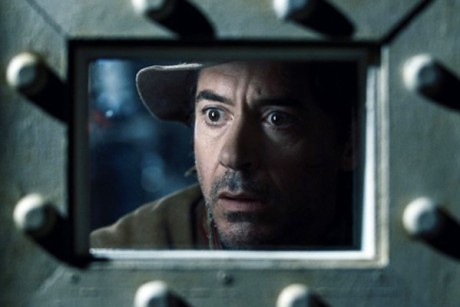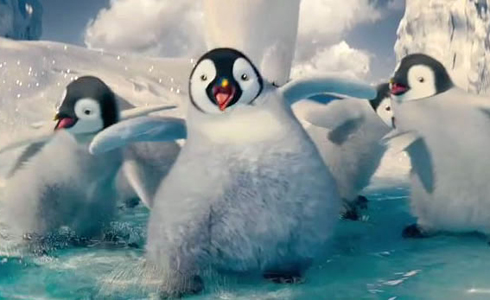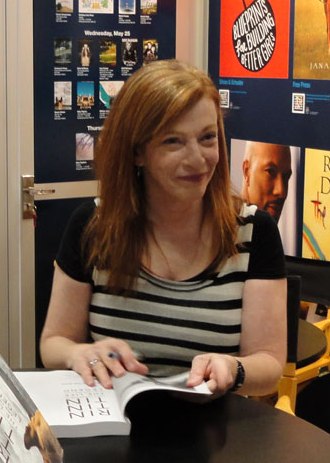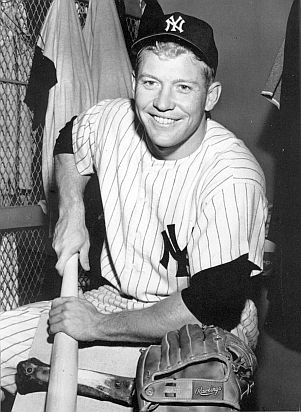 I was extremely psyched when this opportunity came up. The woman has carved out her own path as an artist, filmmaker, and writer. What's more remarkable? She's talented (and in-demand) in all of those areas. In a world of pseudo, lame-o triple threats like Jennifer Lopez, July is the real thing.
I was extremely psyched when this opportunity came up. The woman has carved out her own path as an artist, filmmaker, and writer. What's more remarkable? She's talented (and in-demand) in all of those areas. In a world of pseudo, lame-o triple threats like Jennifer Lopez, July is the real thing.
So, aside from being a fan, imagine my surprise when it turned out she was the cat's ass. Having reviewed the tape and gotten over my nerves, July may have been one of the most cooperative interview subjects ever. There wasn't one canned answer. No is-this-over-yet? gestures.
I think the interview, which apeared in "ICON" and is reprinted with permission, shows that. Enjoy.
P.S.--Having now seen both of them up close, Darcy Savit Croatto doesn't look like Miranda July.********************************
Six years ago, Miranda July wrote, directed, and starred in Me and You and Everyone We Know, a wonderfully offbeat, bittersweet character study that earned her critics' darling status. Anyone else would have made three more movies since then. July, however, doesn't consider herself to be just a filmmaker.
This is not the philosophical yammering of the deluded. She's put out a terrific collection of short stories, No One Belongs Here More Than You, worked on art projects (known as a performance artist, her work has been featured at the Guggenheim and the Museum of Modern Art), and finished a non-fiction book. There's also a novel that needs tending to.
The time between feature films hasn't diminished July's talents. Her latest, The Future (opening in Philadelphia on Aug. 12), is a moody, resonant meditation on modern life centering on a young couple, Sophie and Jason (July and Hamish Linklater), whose decision to adopt a very sick cat causes their lives to catastrophically unravel.
Paw-Paw, the feline waiting to be taken home, narrates; July provides the voice. The moon speaks. Time stops and starts. What differentiates July, who also wrote The Future, from the likes of Todd Solondz and Charlie Kaufman is that her weirdness embraces the world, not pushes back at it. She's not afraid to be vulnerable. Some may find her film's plot twists unbearably artsy or self-indulgent, but look again: They comment on how the rhythms and expectations of daily life affect us.
Thankfully, July, 37, does not let her work speak for herself. During a 40-minute interview last month, she was an interviewer's dream: eloquent, honest, and funny. She spoke about life as an "artistic polymath," the challenges and rewards of directing her anticipated follow-up, and what she wants audiences to take away from it.
Pete Croatto: When Me and You and Everyone We Know was released, a profile of you in the New York Times declared: "The next movie will be easier to finance with a bigger budget and a star or two. And Hollywood just might come knocking, as it has for other gifted, offbeat directors." Is any part of that statement true?
Miranda July: [Laughs.] Ah, let's see. It wasn't easier to finance in part because of the recession happened right around the same time and also because I think these scripts are never easy. If I had written the same exact script again they'd be like, "We know she can do this," but it had all these new things that people were unsure about.
PC: So, it was a combination of the recession and the script being too daring? Was it more one thing than the other, or did both play equal parts?
MJ: There were plenty of people who wanted to make it—it just couldn't be for very much money. That was very much determined by what the market can bear: You make it for this much, you have to sell it for this much. There's kind of a known range for that. Even if you do have a star, frankly, it doesn’t that get much higher.
PC: What's surprising to me is that the people who make these decisions have seen your work. It's not like they're expecting a romantic comedy about two New Yorkers.
MJ: Right after the first movie, there were different offers. I don't know [about] "Hollywood comes knocking," but there were a few knocks. But the other thing is, I worked on my other work for a while and came at this, you know, in a very organic way through this performance [Things We Don’t Understand and Are Definitely Not Going to Talk About, the inspiration for The Future]. But I didn't strike while the iron was hot. I never do that, it seems. To not have a star, ultimately, I did meet with a whole lot of people [for the male lead] but they didn't seem as right as the guy I chose [Linklater].
PC: You didn't feel any pressure to direct another movie right away?
MJ: I felt it, but I didn't heed it. I felt a greater pressure to put out my book of short stories.
PC: Did the time off between films help you in any way?
MJ: It helped me in every way because it was what I wanted to do. And, just practically, I was trying to make a career that was more like the career I really wanted to have, which isn't just a film career. I make a living from the fiction, not from movies. In the most practical sense, like, that's what I'm living off of. I then started writing a novel, enough to sell that. If I had just been going from indie movie to indie movie I think I'd be in dire straits.
PC: So, life got in the way, but in a good way. You had your own projects.
MJ: It wasn't life got in the way; it was very calculated, seriously. That sort of sounds like I was unaware and time just passed. If I try to write another script now it's going to be bad because I'm going to be doing it in order to prove I can do a second movie, so I need to work exactly in the way that I've had for the last 10 years.
PC: It's obviously worked for you because I read somewhere that you haven't had a day job since you were 23.
MJ: Right. I've also been quite poor and used to be a thief, so that's not saying that much, you know.
PC: I know you were arrested for shoplifting once years ago. I had no idea you had such a criminal background.
MJ: It was just years and years of not paying for stuff.
PC: Like the rest of America right now.
One line in The Future that struck me is how the film's couple, Jason and Sophie, is "in the middle of the beginning." What made you decide that now was the time for this movie, instead of 20 years later, when you may have more to say about life?
MJ: I was thinking a lot about the future. I met my husband [Mike Mills, the director of Beginners] and kind of had that moment where you realize you're going to try and be with someone for, like, the whole life. Which kind of makes you think about the whole thing. Even though it's a good thing, you're suddenly really thinking about death more and being an old person. Those were all kind of new thoughts to me, and then while I was having those new thoughts, through doing another project where I'm interviewing people selling things through the PennySaver classifieds, I met this actual person at the end of their life [her co-star, the late Joe Putterlik], this old man who had been with his wife forever who was making these raunchy cards for her. It was the lens I was looking at everything through, but you're right: You could almost make the same movie again.
PC: Though it's not epic in terms of budget and stars, The Future feels grand. It covers relationships, mortality, time, technology, and a cat serving as the narrator. How do you corral all those ideas without losing a connection with the audience?
MJ: That's the area that's really exciting to me: How can this still feel surprising, where you're engaged enough to be surprised, and funny or sad where you're actually feeling sad? All those things plus see these ideas that are not necessarily very grounded in the visual world. Some of that with this movie was letting myself be free in the way that I might in a short story or something with metaphor, but be very simple about it—it wasn't like he stopped time, he stopped time— really use the emotional value of [metaphors].
That word "epic," I would try and impress that upon people in pitch meetings: "I know this seems small or quirky or whatever, but to me this is like an epic drama." There's a journey through the night. If nothing else having that in mind constantly—this is almost like a fable, we know this story. Hopefully that intent comes through.
PC: You have that idea, but you have two ordinary people going through the ordinary twists and turns of a relationship. But there's also this grand swelling underneath.
MJ: I never want to be grand about the grand stuff. That's just embarrassing to me, because none of us are living that life. When you have grand feelings there's still these objects around; the present moment, always, something is wrong in it.
PC: One aspect of the film that spoke to me was how Sophie and Jason are tethered to the Internet. Sophie cuts them off, hoping to create a series of dances for YouTube, but instead she's paralyzed. Is it still hard for you to make that creative leap when working on something new?
MJ: Whether or not it is—and sometimes it is, sometimes it isn't—I'm always afraid of that. I think that was the main thing for me: Wow, even though I keep managing to make things, I only seem to be getting more and more afraid that I'm not going to be able to. It seemed worse looking at that.
PC: You still have that fear, even though you're well established?
MJ: Oh, yeah. Sure.
PC: Does that drive you?
MJ: Probably, yeah. It's not a relaxed environment inside. [Laughs.]
PC: Can you picture your life without that creative tension?
MJ: It's always been really high stakes to me, even before there was any attention. It's like everything has to be born out of the crucible of my inner whatever. It's not just my art. The person who lives with me knows each day we live and die a million, tiny deaths. He's not doing that, he's fine. [Laughs.] He's wired differently. But I take each thing so hard. I have kind of a sense of humor about it at this point.
PC: Reading the production notes, you talk about working in a world without distractions, as Sophie attempts to do, and that this would be about the worst thing possible because "no one would have time to watch me every second." In this environment, "my true self would haunt me, and this would be a nightmare. It was very painful to act all of this out."
Two questions: First, was making The Future therapeutic in any way? Second, is part of your artistic motivation – whether it's your performance art, short stories, or films – the desire to stay connected to the outside world?
MJ: There's a pretty isolated, lonely tendency in myself that doesn't seem to be improving wildly. [Laughs] So I really have to hurl myself at that wall. It's pretty good at that, as it turns out. I mean, the work does a good job of that. Is it therapeutic? Well, not really in the way those notes would imply, that I worked through that. Putting yourself through hard things and surviving them, there's something therapeutic about that. Part of what was painful about it was just it was a hard movie to make. We shot it in 21 days. It's therapeutic because it makes me braver by the end, and I sort of ruined the idea of affairs with creepy men. It's like, "Can't do that now, I just made a movie about it." Unfortunately, sometimes I'll point at the moon and I'll be like, "Ruined." And the beach [which is also featured in The Future]? Ruined, at least for a while.
PC: Is it hard to live a life normally and not have it tethered to anything artistic?
MJ: It is kind of hard, yeah. Sometimes I don't know what I'm supposed to be doing. I'll feel myself looking for some way to use whatever the moment I'm having to get through for art. Sometimes I'll be like, "Come on, just hang out here. Everyone else here seems to be doing it." Or I'll just give in. I'll be like, "Well, we all have our crutch and that's mine." It could be worse.
PC: You told Interview magazine last year, "Life is so ridiculously gorgeous, strange, heartbreaking, horrific, etc., that we are compelled to describe it to ourselves, but we can’t! We cannot do it! And so we make art." Without getting into a debate about what art is, how does making movies help you describe life?
MJ: You can't. I always have this sense of failing at it, but there's something about the trying that makes it this other thing that's very human, that's like what a person would do if they were trying to describe life. In that, you didn't describe the thing itself, but you did a really good enactment of what we do, which is a good thing to have examples of.
PC: I'm not sure I get it.
MJ: Let's say there's God. [Gestures to wall.] You couldn't describe him, but your picture that you would paint would be a really maybe important thing, because it would have devotion in it, it would have this reaching and this yearning and it'd be this trying to get at something that's impossible to get at. That, in and of itself, is a good thing to have, but it's not God.
PC: A lot of people know you for being, to borrow a journalist's phrase, "an artistic polymath."
MJ: It makes me seem like I'm good at math, which I'm not. [Laughs.] It's the one thing I'm not good at it.
PC: How hard is it to shift from one medium to another, and what made you realize that The Future would work best as a movie?
MJ: It's easy to move between the mediums. The hard thing is sticking with the one when you really have to. At a certain point, there has to be, like, a whole year of just movie in order to make the movie. I sort of feel condemned to eighth grade. There's something kind of sad about that to me.
PC: So writing a screenplay becomes like completing your civics homework?
MJ: Right. You can do other things at the same time. The performance [Things We Don’t Understand and Are Definitely Not Going to Talk About], I felt really good about it. I liked it a lot. For one thing, I didn't want to tour. I didn't want to travel the world with it, which is the next thing you do with a performance. I don't really like that life. That was one part of it, and then I was like, "Oh, and conveniently, I need to make a second movie anyway." And I think I just kind of tricked myself in through the door on that, where I don't have to have that part where I'm like, "What's it going to be about, what idea is good enough?" I also thought if I could pull it off as a movie it'd be more interesting in this less avant-garde context.
PC: In going from one medium to another, how are your days scheduled?
MJ: It's always different, but a lot of times if I'm going to write, I'm going to write in the first half of the day. And then sometimes I'll say, "If I can write until two, then I can work on these art ideas or this performance or something that seems like a break." Or they'll just be things I need to do. Like when I was invited to be in the Venice Biennale it was like, "Rad." I had to come up with sculptures, and I had these lovely days where I would write and then go make something in clay.
PC: The reason I ask is that as a freelance writer I find it hard to toggle from a book review to a movie review…
MJ: If they're all kinds of writing, that's hard.
PC: It's much easier to go from performance art to script to something else?
MJ: They have to be pretty different, because you want the feeling that you're playing hooky from the one. That's what's useful. If it's between two writing things, sometimes that works if it's a short, fun writing thing and then your book. That can work.
PC: A lot of people think that the days are open-ended for anyone who works in a creative field, that you write or do whatever you do when the muse strikes.
MJ: No, it's all endless to-do lists and there's never enough time in the day and it's a lot of discipline.
PC: Going back to The Future, since I'm not writing about Larry Crowne, I feel this is valid question to ask: What do you want people to take away from the movie?
MJ: That's funny. In the Minneapolis screening at The Walker [Art Center], there were these two friends who were like writing friends. All they did was write together. They said, "We just wanted to say hi, but we're going to go to this place where we write and we just feel so inspired we're going to do that right now." That's like the best compliment. For me, when something makes me feel that way, that's like gold, really valuable. To be that thing…It's not necessarily that you're going actually go make something, but that maybe you feel like you have some new space that’s for you to feel something in or do something in.
PC: You want people to feel like there's some wiggle room in their lives to do the things they want to do?
MJ: Or feel something new, and that thing might be a sad feeling. I'm not saying everyone's going to go out and make crafts and be happy or something.
PC: What I love about your movies is that they're gloriously open-ended.
MJ: I guess the only thing I would hope is that they do feel something, that there'd be more an increase in feeling by the end. [Laughs.]
PC: That's a great tagline for the poster.
MJ: An increase in feeling—guaranteed.
PC: Are you optimistic about your own future or, do you, like Jason, consider yourself at the "loose change" part of your life?
MJ: I don't feel that way. So many of my friends are quite a bit older than me and I always cringe, like, I hope they don't think I think that about them. But I do sometimes have this getting ahead of myself thing, where I'm already thinking of myself as if I'm 60 or something…I don't know how I do some crazy math where it's all gone, the time. And I have to kind of remind myself: You're actually still in the scheme of things in the young part of your life, God willing. And I feel hopeful. I guess there is hope in that because I'm so invested and there's so much I want to do. I like it. [Laughs.]
PC: How's your novel going?
MJ: Well, according to these interviews, it just keeps getting realer and realer. [Laughs.] I just made a movie and now I've been promoting it. I did write a book in the last six months, but it wasn't the novel, it was a non-fiction book [It Chooses You, available this fall] that has to do with all the people I interviewed through the PennySaver thing but is also very personal. [Adopts helpful tone.] People can read that while I'm writing the novel.
PC: You're big on observing life and drawing from that. Do these interviews and the press tour feed the creative side?
MJ: Kind of, at first, although I'm sort of shutting down a bit with my interest and all that, only because I'm in self-preservation mode only as of the last couple of days. I'm out for two weeks this time, so you hit that one-week-to-go wall. That stuff is interesting. I've been doing this, also, for six months on and off. There's part of me that feels really, really guilty for not working every day, not writing or making something new.
PC: Do you squeeze work in on plane trips, in your hotel room?
MJ: I don't. I'm not really writing. Sometimes I have an idea, but this is pretty hard work. I have to give myself a break. And also, to some degree, I'm going to be writing for the next few years. This is the part that you fantasize about when you're writing. So it's OK.
PC: So sitting across the table from a sweaty, bearded journalist is part of the dream?
MJ: [Laughs.] I've been waiting for this!
 This is an annual form of distress for me. Inevitably, I'll forget something or feel bad that I haven't seen two or three key films that were adored by the masses. But that's the way it goes. I'm never going to see everything. All I can do is write about how the films affected me, and share that love, hate, or indifference in the most expressive way possible.
This is an annual form of distress for me. Inevitably, I'll forget something or feel bad that I haven't seen two or three key films that were adored by the masses. But that's the way it goes. I'm never going to see everything. All I can do is write about how the films affected me, and share that love, hate, or indifference in the most expressive way possible. 































